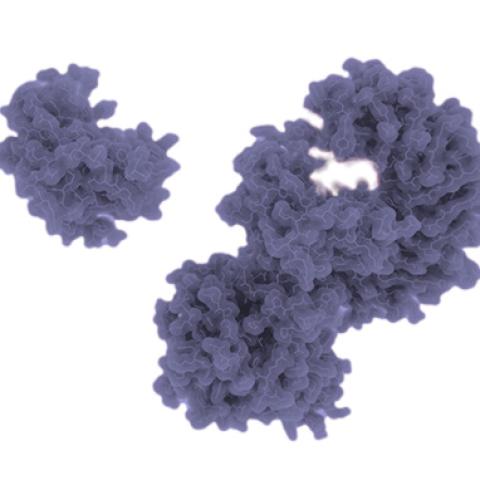
Vimseltinib is an oral switch-control tyrosine kinase inhibitor specifically designed to selectively and potently inhibit CSF1R. TGCT is a locally aggressive neoplasm caused by dysregulation of the colony-stimulating factor 1 (CSF1) gene, leading to overproduction of CSF1. Surgery is the current standard of care for TGCT; however, many patients will recur after surgery. If left untreated, patients living with TGCT experience pain, range-of-motion limitations and other debilitating effects including joint destruction. We designed vimseltinib to offer a new and differentiated treatment option for the TGCT community. Vimseltinib was developed using our proprietary switch-control kinase inhibitor platform.
-
Changing the Treatment of TGCT
TGCT, previously known as pigmented villonodular synovitis or giant cell tumor of the tendon sheath, is a locally aggressive neoplasm caused by dysregulation of the colony-stimulating factor 1 (CSF1) gene leading to overproduction of CSF1. The median age of diagnosis for TGCT is 33 years old with a lifetime risk of recurrence and negative impact on quality of life.
Patients with TGCT experience substantial symptomatic burden including pain and stiffness, impaired physical function and limited range of motion, which negatively impacts quality of life. While some cases of TGCT can be surgically resected and cured, others can be difficult to live with and challenging to treat. Disease can recur, and multiple surgeries may be needed, increasing the risk of complication and negative outcomes. 39% of TGCT patients with two or more surgeries reported a change in occupation or premature retirement due to their condition. For patients who are not amenable to surgery, systemic treatment options are limited. If left untreated TGCT can invade and destroy the surrounding soft tissue and joint, causing irreversible damage and significant disability. When untreated, patients experience pain and range-of-motion limitations, moderate to severe joint deformity, degenerative articular changes and osteoarthritis; resulting bone destruction can require joint replacement or amputation.
-
Vimseltinib in TGCT
Romvimza® (vimseltinib) is approved by the U.S. FDA for the treatment of adults with TGCT and in the E.U. for the treatment of adult patients with symptomatic TGCT associated with clinically relevant physical function deterioration and in whom surgical options have been exhausted or would induce unacceptable morbidity or disability. Our new drug application (NDA) was based on positive results from our Phase 3 MOTION study in patients with TGCT. MOTION is a two-part, randomized, placebo-controlled, double-blind study that evaluated the efficacy and safety of vimseltinib in patients with TGCT not amenable to surgery. The study met its primary endpoint of objective response rate (ORR) by independent radiological review using Response Evaluation Criteria in Solid Tumors version 1.1 (RECIST v1.1) at week 25 in the intent-to-treat (ITT) population.
In addition to meeting the primary endpoint, the study met all six key secondary endpoints, all of which were clinically meaningful. Vimseltinib was well-tolerated and the safety profile in the MOTION study was consistent with previously disclosed data.
To learn more about Romvimza, click here. Please see the product website and below for complete safety information and full prescribing information.
To learn more about this study, click here.
-
Vimseltinib Phase 1/2 Study
We are currently studying vimseltinib in an international, multicenter, open-label Phase 1/2 study to assess its safety, efficacy, pharmacokinetics, and pharmacodynamics in patients with TGCT. In the ongoing study, vimseltinib was well tolerated, exhibited promising antitumor activity and provided clinically meaningful symptomatic benefits in patients with TGCT not amenable to surgery.
Phase 1 is a dose escalation phase to determine the recommended phase 2 dose and the maximum tolerated dose. Phase 2 is an expansion phase to evaluate the safety, tolerability, and preliminary efficacy in two TGCT cohorts. Cohort A includes TGCT patients with no prior anti-CSF1/CSF1R (previous therapy with imatinib or nilotinib is allowed) and cohort B includes patients with prior anti-CSF1/CSF1R (previous therapy with imatinib or nilotinib alone is not eligible).
To learn more about the Phase 1 study, click here. To learn more about the Phase 2 study, click here and here.
-
Vimseltinib in cGVHD
Deciphera is currently enrolling patients in a Phase 2 proof-of-concept study of vimseltinib in adults with active chronic Graft-Versus-Host Disease (cGVHD).
To learn more about this study, click here.
-
Related Presentations and Publications
-
U.S. Indication and Important Safety Information about VIMSELTINIB
ROMVIMZA (vimseltinib) capsules
INDICATIONS AND USAGE
ROMVIMZA is indicated for treatment of adult patients with symptomatic tenosynovial giant cell tumor (TGCT) for which surgical resection will potentially cause worsening functional limitation or severe morbidity.
IMPORTANT SAFETY INFORMATION
WARNINGS AND PRECAUTIONSHepatotoxicity:
- Cases of serious and fatal liver injury have occurred with the use of another kinase inhibitor that targets CSF1R. Serious and fatal liver injury have not been observed with ROMVIMZA.
- Elevated AST and ALT can occur with ROMVIMZA.
- Avoid ROMVIMZA in patients with pre-existing increased serum transaminases; total bilirubin or direct bilirubin (>ULN); or active liver or biliary tract disease, including ALP.
- Monitor liver function tests prior to initiation of ROMVIMZA, twice a month for the first two months and once every 3 months for the first year of therapy and as clinically indicated thereafter. Withhold and reduce the dose, or permanently discontinue ROMVIMZA based on the severity of the hepatotoxicity.
Embryo-Fetal Toxicity:
- ROMVIMZA may cause fetal harm when administered to pregnant women. Advise pregnant women on the potential risk to the fetus.
Advise females of reproductive potential and males with female partners of reproductive potential to use effective contraception during treatment with ROMVIMZA and for 1 month after the last dose.
Allergic Reactions to FD&C Yellow No. 5 (Tartrazine) and No. 6 (Sunset Yellow FCF):
- ROMVIMZA 20 mg capsule contains FD&C Yellow No. 5 (tartrazine) which may cause allergic reactions (including bronchial asthma) in certain susceptible patients. FD&C Yellow No. 5 (tartrazine) sensitivity is frequently seen in patients who also have aspirin sensitivity.
Advise patients that ROMVIMZA 14 mg and 20 mg capsules contain FD&C Yellow No.6 (Sunset Yellow FCF), which may cause allergic reactions.
Increased Creatinine without Affecting Renal Function:
Increases in serum creatinine can occur with the use of ROMVIMZA. These increases in serum creatinine may not be associated with changes in renal function. Increases in creatinine reversed upon ROMVIMZA discontinuation. During ROMVIMZA treatment, use alternative measures that are not based on serum creatinine to assess renal function.
Adverse Reactions:
The most common (≥20%) adverse reactions, including laboratory abnormalities that occurred in patients receiving ROMVIMZA were increased AST, periorbital edema, fatigue, rash, increased cholesterol, peripheral edema, face edema, decreased neutrophils, decreased leukocytes, pruritus, and increased ALT.
Drug Interactions:
- P-glycoprotein (P-gp) substrates: Avoid concomitant use of ROMVIMZA with P-gp substrates. If concomitant use cannot be avoided, take ROMVIMZA at least 4 hours prior to P-gp substrates.
- Breast Cancer Resistance Protein (BCRP) substrates: Avoid concomitant use of ROMVIMZA with BCRP substrates.
- Organic Cation Transporter 2 (OCT2) substrates: Avoid concomitant use of ROMVIMZA with OCT2 substrates.
- Concomitant use of vimseltinib with P-gp substrates, BCRP substrates or OCT2 substrates may increase exposure of these substrates.
Lactation: Advise females not to breastfeed during treatment with ROMVIMZA.
Please click here to see the full U.S. Prescribing Information for ROMVIMZA.

